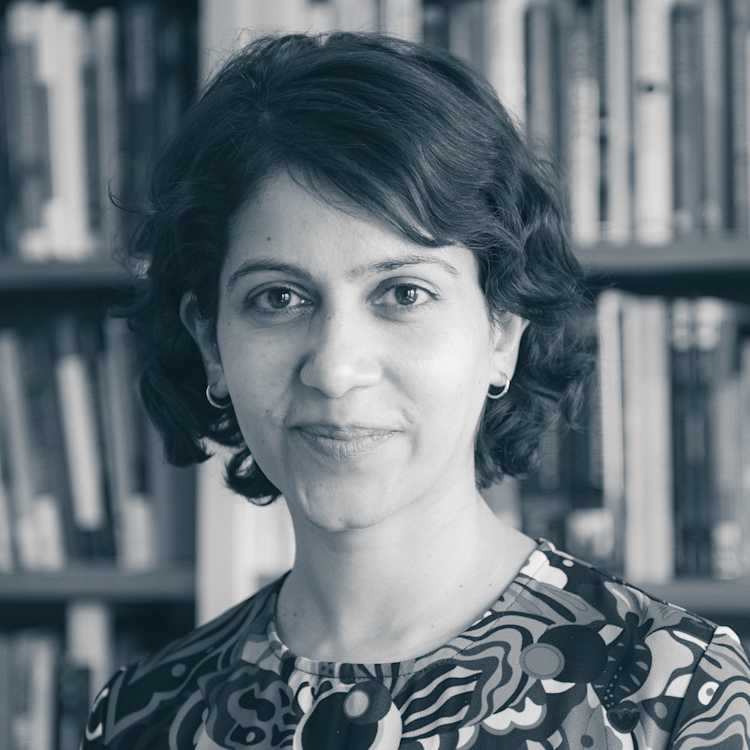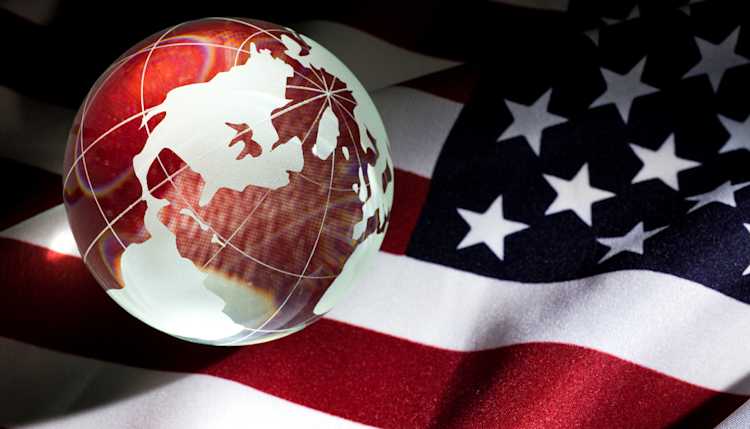- Startseite
- Publikationen
- GIGA Focus
- The Rising Authority of International Organisations
GIGA Focus Global
Die wachsende Autorität internationaler Organisationen
Nummer 4 | 2017 | ISSN: 1862-3581

In jüngster Zeit sind internationale Organisationen unter Druck geraten. Der Brexit, die Wahl Donald Trumps und der Aufstieg Chinas – alle diese Entwicklungen scheinen ein Beleg dafür zu sein, dass etablierte internationale Organisationen an Autorität verlieren. Tatsächlich ist aber die formelle Autorität internationaler Organisationen in den letzten Jahrzehnten beträchtlich gestiegen.
Die Autorität internationaler Organisationen ist in den letzten Jahrzehnten gestiegen, das heißt, sie sind heute weniger abhängig von der Kontrolle durch einzelne Mitgliedsstaaten. Die zunehmende Autorität internationaler Organisationen spiegelt sich darin, dass nationale Regierungen (a) auf ihr Vetorecht verzichten, indem sie Mehrheitsentscheidungen akzeptieren (Stimmenbündelung/pooling), und (b) unabhängige Institutionen ermächtigen, für sie zu agieren (Delegation).
Der Zuwachs an internationaler Autorität beinhaltet Zielkonflikte; pooling und Delegation werden selten kombiniert. In sektorbezogenen Organisationen (task-specific) ist die Stimmenbündelung weit verbreitet und Delegation eingeschränkt; in Organisationen mit übergreifender Zielsetzung (general-purpose) ist das Gegenteil der Fall.
Für die Ausweitung internationaler Autorität sind drei Faktoren ausschlaggebend: (i) notwendige Bemühungen, die Effektivität der Kooperation zu sichern, (ii) zunehmende Partizipationsforderungen vonseiten nichtstaatlicher Akteure und (iii) die Verbreitung autoritativer institutioneller Vorbilder unter internationalen Organisationen (Diffusion). Diese Faktoren werden wahrscheinlich auch zukünftig in Richtung auf eine Ausweitung internationaler Autorität wirken.
Allerdings ruft die Stärkung internationaler Organisationen auch Widerstand hervor und Regierungen entwickeln Strategien zur Umgehung von Organisationen, die sie als zu autoritativ betrachten. Diese Entwicklungen könnten bestehende internationale Organisationen schwächen.
Fazit
In der Nachkriegsperiode haben internationale Organisationen zumeist nicht im Rampenlicht operiert; dies ändert sich mit der Zunahme an Autorität. Politiker sollten sich bewusst sein, dass die wachsende Autorität internationaler Organisationen auch politische Gegenreaktionen hervorrufen kann, die eine Stagnation oder sogar Rückschritte bewirken können. Auch wenn es in einer zunehmend verflochtenen Welt überzeugende Gründe für vertiefte internationale Zusammenarbeit gibt – politische Auseinandersetzungen haben das Potenzial, sie in den Hintergrund zu drängen.
Authority Is Rising among International Organisations …
Recent political developments appear to indicate that established international organisations are in decline. According to many commentators, Brexit and the ongoing migration and Euro crises have shattered the integrity and image of the European Union. Keystone organisations of the post–Second World War international order – namely, the United Nations, the World Trade Organization, the World Bank, and the International Monetary Fund – seem to be increasingly ridden by conflicts between established and rising powers, which has led to paralysis in some cases. The North Korean nuclear conflict is a case in point. And the election of Donald Trump seems to herald the United States’ departure from its long-standing support for institutionalised international cooperation. Resistance, especially on the part of African countries, has overshadowed the inception of the International Criminal Court. And the establishment of several high-profile, less-intrusive, rival organisations – such as the China-led New Development Bank and the Asian Infrastructure Investment Bank – appears to confirm the impression that established international organisations are losing authority.
However, despite this perception and the fact that international organisations may have become increasingly contested, their authority has actually grown significantly in recent decades. In terms of formal authority, international organisations have become more authoritative, especially since the end of the Cold War. There are reasons to believe that this trend will continue in the coming decades.
Political authority denotes the power to make collectively binding decisions – that is, decisions that ought to be obeyed. Accordingly, international authority is the ability of international organisations to take such decisions independent of the control exerted by member states. From this perspective, international authority is, and always will be, incomplete. Even today, member states (or, more accurately, member state governments) remain the primary actors in international organisations: they adopt decisions and have the power to curtail or entirely abolish an organisation. However, political authority is not an all-or-nothing concept, and international authority also exists in gradations. The traditional international organisation model – characterised by the practice of pure “executive multilateralism” (Zürn 2014: 52), which sees governments negotiate and ultimately adopt decisions by consensus – is becoming rare.
Since the end of World War Two, individual governments have been increasingly sharing power in international organisations in two distinct ways: (a) pooling decision-making competence by setting aside veto options and endorsing majoritarian forms of governmental decision-making or (b) delegating power to institutions that are composed of non-state actors to help governments reach their cooperative goals. The European Union is the best-known example of an international organisation in which the (qualified) majority of governments takes decisions (pooling authority). However, other international organisations commonly use similar procedures – for instance, the United Nations has its General Assembly, and the World Bank uses pooled decision-making by its executive directors.
Many international organisations have independent institutions (e.g. general secretariats, parliamentary bodies, expert bodies, and courts) that help governments to negotiate, adopt, and enforce decisions. Again, the European Union is the most prominent example of an international organisation in which governments delegate various competences. For instance, the European Commission is composed of technical experts and is able to propose legislation, while the European Court of Justice is made up of lawyers who enforce agreements by rendering binding judgments. There is also the directly elected European Parliament, which is on par with the governmental Council of Ministers with regard to taking decisions. Although the confluence of delegated powers in the European Union is unique, similar institutions can be identified in other international organisations. For example, Mercosur has a (partially) directly elected parliament, whereas the East African Community has a legislative assembly (which is composed primarily of national parliaments) that adopts decisions. Moreover, the tribunals of the Economic Community of West African States and of the Andean Community both enjoy competences comparable to those of the European Court of Justice.
Figures 1 and 2 show the evolution of mean pooling and delegation in 51 international organisations during the period from 1975 to 2010. To measure pooling, a team of co-authors coded (i) the extent to which organisational bodies composed of member state representatives deviate from the consensus principle in the agenda- and decision-making stages in six decision areas (membership accession, membership suspension, constitutional reform, budgetary allocation, budgetary non-compliance, and policymaking) and (ii) whether these decisions are binding and have to be ratified domestically.
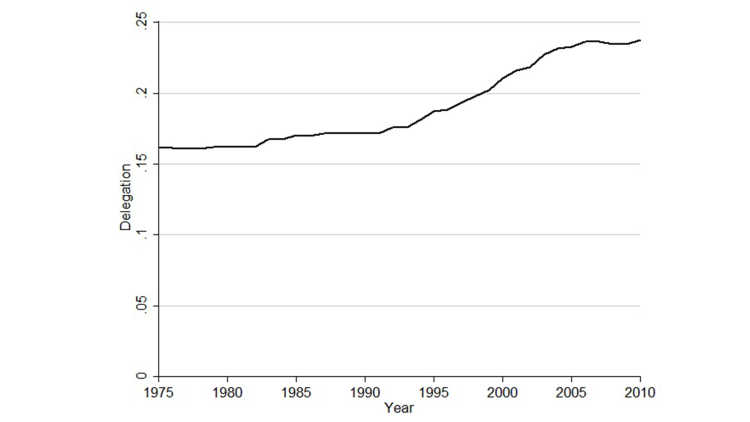
To measure delegation, we coded the extent to which bodies that are mainly or entirely composed of non-state actors contribute to agenda-setting, decision-making, and dispute resolution in the six aforementioned decision areas (Hooghe et al. 2017).
Figures 1 and 2 show that both delegation and pooling remained relatively stable until the mid-1980s, at which point they increased substantially; though delegation grew more strongly than pooling. The mean delegation score went from 0.16 in 1975 to 0.18 in 1992 and then grew rapidly, reaching 0.24 in 2010. The mean pooling score increased from 0.28 in 1975 to 0.30 in 1992 and then climbed steadily, reaching 0.35 in 2010. In sum, international authority has grown substantially since the Second World War, especially in the post–Cold War era.
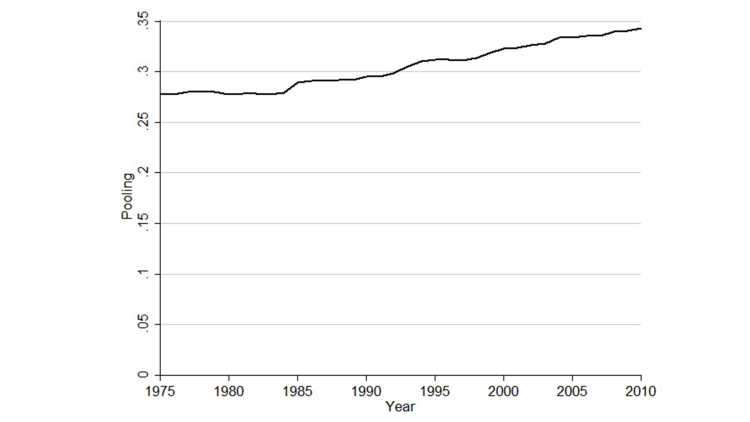
… But There Are Trade-Offs
Rising international authority entails a loss of control for national governments and, thus, of national sovereignty. Even before the rise of explicitly nationalist governments in many parts of the world, governments were protective of their national sovereignty and rarely consented to ceding their autonomy through both delegation and pooling. In other words, governments either seek to retain their veto powers or to avoid endowing autonomous actors with extensive agenda-setting, decision-making, or dispute-resolution powers. The European Union and the World Trade Organization, which have high levels of both delegation and pooling, are the exception, not the rule.
Our joint research on international authority reveals that this trade-off generates two types of international organisation with contrasting institutional profiles (Lenz et al. 2015). On the one hand, there are general-purpose organisations, which are structured around a community of states that share certain historical, cultural, and/or geographic features and engage with the policy problems that emerge as member states interact across national borders. These organisations bundle together the many policy challenges that they face and, accordingly, tend to address a broad range of policies. General-purpose organisations may deal with security alongside trade or environmental concerns alongside transport, cultural, human rights, or migration issues. Such organisations express a sense of shared purpose amongst their members and are therefore generally regional in nature. In the international realm general-purpose organisations are the groups most comparable to national governments. Examples include the European Union, the Andean Community, the Southern African Development Community, and the Association of Southeast Asian Nations. As figures 3 and 4 show below, such organisations tend to empower autonomous actors to an increasing extent over time, but they rarely move to majoritarian decision-making.
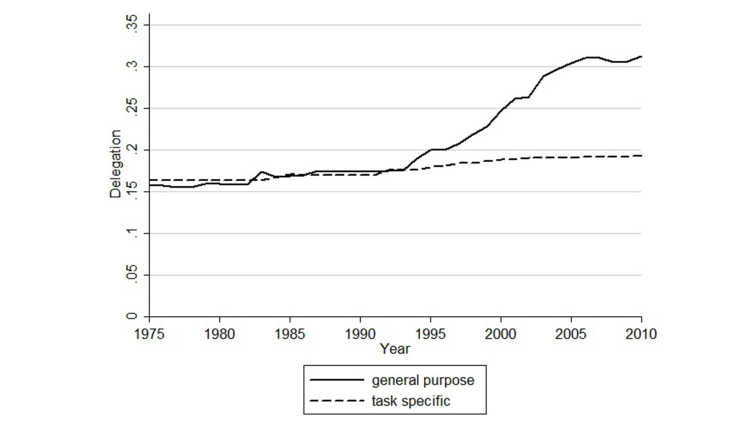
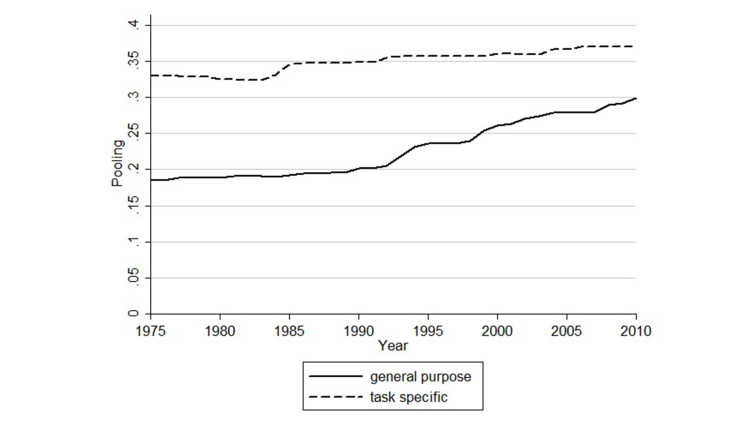
On the other hand, there are task-specific organisations. These organisations are built around a particular problem in a specific policy domain (e.g. trade, telecommunication standards, food safety, or security) rather than a shared community. Thus, task-specific organisations focus on a narrow range of policies, but they find it easier to encompass a larger number of members. In fact, most of them are near global in nature. The Bank for International Settlement, the European Free Trade Association, the International Civil Aviation Organization, the International Maritime Organization, and the World Bank are all task-specific organisations. In stark contrast to general-purpose organisations, task-specific organisations conventionally use majority voting to take decisions and are less predisposed to empowering autonomous actors, as shown in figures 3 and 4.
One way to understand this trade-off between delegation and pooling is to consider the extent of sovereignty loss that inheres in each of these two forms of authority (Lake 2007). Ceding the national veto is the most severe form of sovereignty loss because majority voting means that decisions can be taken against an individual government’s will. Governments are only prepared to accept this when the danger of organisational paralysis looms large and when they can be certain that this infringement on national sovereignty affects only a small and non-central part of their overall authority. This is the case in task-specific organisations, which tend to address technical issues and have narrow policy scopes. This is not necessarily so for general-purpose organisations, which have broad policy scopes that may more easily upset national sensitivities. Hence, governments in general-purpose organisations are more reluctant to pool sovereignty. Delegation, however, is less sovereignty-encroaching and enables governments to retain the power to reign in delegated institutions that overstep their competence or take decisions that do not please governments. Delegation can also be extremely useful when cooperation is anchored in treaties that lack detail on how cooperative goals are to be achieved. This is the case in general-purpose organisations, where independent secretariats, courts, parliaments, or consultative forums help to make up a vaguely defined cooperative terrain by putting issues on the agenda, providing expertise, or helping to monitor and enforce agreements.
What Drives the Rise in International Authority?
The sources of this varied increase in international authority are chiefly the result of three factors: functional demand, calls for political participation, and diffusion.
First, more extensive authority may be functionally desirable to maintain or improve the effectiveness of international organisations. Globalisation means greater interdependence, and governments find it increasingly difficult to unilaterally solve problems that cross national borders, such as economic growth, peace and security, and pollution. Moreover, the growing membership of most international organisations over the last 70 years – due to their appeal as well as to decolonisation and the dissolution of the Soviet Union – has made it more difficult to find common ground and adopt decisions. For instance, the ongoing blockage in the World Trade Organization is due to member states’ diverging interests in the width and depth of liberalisation. As a result, governments in various international organisations have decided to circumvent national vetoes by taking majority-based decisions rather than unanimous ones. More delegation may also be the result of functional demand. As interdependence grows, many international organisations extend their policy scopes in order to manage this change, which then complicates decision-making. In such situations empowering autonomous actors can be a useful way to facilitate intergovernmental bargaining, generate policy-relevant expertise, and monitor compliance with decisions.
Second, non-state actors have actively demanded more political participation in international organisations. Since the end of the Second World War, the number of actors seeking to influence international politics has grown tremendously. International non-governmental organisations such as Amnesty International, multinational companies such as Google and Facebook, expert bodies and other epistemic communities such as the Intergovernmental Panel on Climate Change, or national parliamentarians organised in transnational parliamentary forums have taken a strong interest in international organisation decision-making. These non-state groups contest the traditional notion that international organisations are the exclusive domain of national governments. They demand access so that they can influence agendas and policies and hold international organisations to account. Faced with such demands, in view of changing ideas about the appeal of non-state participation, and given their desire to see international organizations succeed, governments have found it expedient to open up international organisations to institutionalised participation by non-state actors (Tallberg et al. 2013).
Third, diffusion explains some variation in international authority. When institutional designs appear to successfully solve cooperation problems or respond to non-state demands, they are used as institutional templates for other organisations. For example, governments in certain international organisations gradually adopted the participatory arrangements for non-state actors institutionalised by the United Nations in the 1980s. Moreover, some organisations act as institutional entrepreneurs, actively seeking to diffuse specific institutional features. The European Union, above all, has advertised the “lessons” of European integration to other organisations that have been willing to listen. It has sought to export its institutional model by depicting it as an integral part of the negotiation of cooperation and trade agreements or by providing financial and technical expertise and political dialogue (Lenz and Burilkov 2017). Today, there are 10 operational copies of the European Court of Justice’s highly authoritative design, most of them in Africa (Alter 2012). As more and more organisations adopt certain institutional features, ideas about appropriate institutional designs for an international organisation are updated, which then puts greater pressure on other international organisations to adapt.
Working together, powerful and durable forces have pushed towards more international authority. First, technological advancements and shrinking physical distance mean the demand for international cooperation, including in international organisations, is likely to remain high. Second, transnational civil society and business are becoming more integrated, and different groups’ desires to be heard in the international realm are likely to increase accordingly. This will further enhance non-governmental actors’ political demands to influence international organisations. The pressure stemming from diffusion for further increases in international authority is less certain. The European Union has lost some of its appeal in the wake of recent crises, and established multilateral organisations are now being contested to a greater degree (see below). Nevertheless, it will take a while until alternative institutional designs have been time-tested and have gained legitimacy with a large number of actors.
The Consequences of This Rise Are Ambiguous
What are the consequences of this rise in international authority for global governance? On the one hand, international organisations with more extensive authority will find it easier to take and enforce decisions, thereby increasing their effectiveness. Indeed, more independent organisations are more successful in achieving their goals, be it mitigating armed conflict, promoting economic integration, or monitoring human rights practices. For example, with its greater sanctioning power, the World Trade Organization was better able than its predecessor, the General Agreement on Tariffs and Trade, to improve compliance with multilateral trade rules (Zangl 2008). At the same time, research on diffusion indicates that copying institutional templates may widen the gap between formal rules and their actual functioning because those templates may be ill-suited for the specific local contexts in which they are implemented (Jetschke and Lenz 2013). Consider the extreme but illustrative case of the Southern African Development Community. Under pressure from the European Union, member state governments created a supranational tribunal in 2006 that was largely modelled on the European Court of Justice and increased the organisation’s authority. However, following a tribunal ruling on a human rights case in Zimbabwe, an outraged Mugabe government not only refused to abide by the decision, it also engineered a coalition of states that first sidelined the tribunal and then eventually abolished it (Nathan 2013). In that case, institutional empowerment made international governance less effective.
On the other hand, more authoritative international organisations are more vulnerable to politicisation – that is, international organisations have become the subject of public contestation (Zürn, Binder and Ecker-Ehrhardt 2012). Authoritative international governance reaches more deeply into national societies and may therefore spur resistance amongst those affected by an organisation’s decision. The international trade regime is a case in point. Whereas the General Agreement on Tariffs and Trade mainly reduced tariffs and quotas “at the border,” the World Trade Organisation decisions that succeeded it often affected domestic regulations and therefore societal preferences. This led to a backlash against trade liberalisation and sparked recurrent large-scale protests in the shadows of global trade meetings. Such politicisation can undermine effective decision-making and hinder implementation.
Politicisation may also improve the performance and legitimacy of international organisations. To the extent that the decisions of international organisations reflect genuine public deliberation, the legitimacy of decisions – and ultimately their effectiveness – may increase. Politicisation may also make it easier for governments to keep powerful domestic special interests in check, thereby enhancing decision-making that is in the public interest (Zürn 2014). In addition, politicisation may “force” organisations to undertake institutional change that enhances their legitimacy in the eyes of their critics. For example, many international organisations have strengthened accountability or transparency (such as making meeting minutes public) (Grigorescu 2015). Politicisation may in fact be less of a threat to international organisations than is commonly thought.
Dissatisfaction with authoritative international organisations also leads to a search for less authoritative alternatives (Morse and Keohane 2014). Stronger international organisations induce some governments to devise strategies to circumvent organisations that they perceive to be overly authoritative. They do so either by creating new international organisations or switching between different forums that address the same issue. An example of the former is the new China-led International Infrastructure Investment Bank, which is more sovereignty-preserving than its chief alternatives, the International Monetary Fund and the World Bank. With regard to the latter method, today, trade liberalisation occurs more often in bilateral and minilateral forums with widely varying levels of authority than it does in the relatively authoritative World Trade Organisation. Similarly, the rise of informal international organisations, such as the “G groups,” also speaks to some actors’ interests in less authoritative international venues that circumvent and may potentially undermine established and more authoritative alternatives.
The trend towards more authoritative international organisations is not unidirectional. Powerful trends tend to breed counter-trends. Thus, the consequences of the growing authority of international organisations are ambiguous and have the potential to weaken international governance. The architecture of global governance is becoming more fragmented. And while the authority of established international organisations is growing, less authoritative alternatives are emerging. Whether these alternatives, akin to their more established counterparts, will also increase their authority over time is by no means certain. International cooperation will continue to be in high demand as interdependence deepens. But governments and non-state actors in this multipolar world order may opt for a more diverse set of cooperative arrangements – some more authoritative than others – to manage independence.
Fußnoten
Literatur
Alter, Karen (2012), The Global Spread of European Style International Courts, in: West European Politics, 35, 1, 135–154.
Grigorescu, Alexandru (2015), Democratic Intergovernmental Organizations? Normative Pressures and Decision-Making Rules, Cambridge: Cambridge University Press.
Hooghe, Liesbet, Gary Marks, Tobias Lenz, Jeanine Bezuijen, Besir Ceka, and Svet Derderyan (2017), Measuring International Authority: A Postfunctionalist Theory of Governance, Volume 3, Oxford: Oxford University Press.
Jetschke, Anja, and Tobias Lenz (2013), Does Regionalism Diffuse? A New Research Agenda for the Study of Regional Organizations, in: Journal of European Public Policy, 20, 4, 626–637.
Lake, David (2007), Delegating Divisible Sovereignty: Sweeping a Conceptual Minefield, in: Review of International Organizations, 2, 3, 219–237.
Lenz, Tobias, Jeanine Bezuijen, Liesbet Hooghe, and Gary Marks (2015), Patterns of International Organization: General Purpose vs. Task Specific, in: Politische Vierteljahresschrift, 49, 131–156.
Lenz, Tobias, and Alexandr Burilkov (2017), Institutional Pioneers in World Politics: Regional Institution Building and the Influence of the European Union, in: European Journal of International Relations, 23, 3, 654–680.
Morse, Julia, and Robert Keohane (2014), Contested Multilateralism, in: Review of International Organizations, 9, 4, 385–412.
Nathan, Laurie (2013), The Disbanding of the SADC Tribunal: A Cautionary Tale, in: Human Rights Quarterly, 35, 4, 870–892.
Tallberg, Jonas, Thomas Sommerer, Theresa Squatrito, and Christer Jönsson (2013), The Opening Up of International Organizations: Transnational Access in Global Governance, Cambridge: Cambridge University Press.
Zangl, Bernhard (2008), Judicialization Matters! A Comparison of Dispute Settlement under GATT and the WTO, in: International Studies Quarterly, 52, 4, 825–854.
Zürn, Michael (2014), The Politicization of World Politics and Its Effects: Eight Propositions, in: European Political Science Review, 6, 1, 47–71.
Zürn, Michael, Martin Binder, and Matthias Ecker-Ehrhardt (2012), International Authority and Its Politicization, in: International Theory, 4, 1, 69–106.
Gesamtredaktion GIGA Focus
Redaktion GIGA Focus Global
Regionalinstitute
Forschungsschwerpunkte
Wie man diesen Artikel zitiert
Lenz, Tobias (2017), Die wachsende Autorität internationaler Organisationen, GIGA Focus Global, 4, Hamburg: German Institute for Global and Area Studies (GIGA), http://nbn-resolving.de/urn:nbn:de:0168-ssoar-53943-1
Impressum
Der GIGA Focus ist eine Open-Access-Publikation. Sie kann kostenfrei im Internet gelesen und heruntergeladen werden unter www.giga-hamburg.de/de/publikationen/giga-focus und darf gemäß den Bedingungen der Creative-Commons-Lizenz Attribution-No Derivative Works 3.0 frei vervielfältigt, verbreitet und öffentlich zugänglich gemacht werden. Dies umfasst insbesondere: korrekte Angabe der Erstveröffentlichung als GIGA Focus, keine Bearbeitung oder Kürzung.
Das German Institute for Global and Area Studies (GIGA) – Leibniz-Institut für Globale und Regionale Studien in Hamburg gibt Focus-Reihen zu Afrika, Asien, Lateinamerika, Nahost und zu globalen Fragen heraus. Der GIGA Focus wird vom GIGA redaktionell gestaltet. Die vertretenen Auffassungen stellen die der Autorinnen und Autoren und nicht unbedingt die des Instituts dar. Die Verfassenden sind für den Inhalt ihrer Beiträge verantwortlich. Irrtümer und Auslassungen bleiben vorbehalten. Das GIGA und die Autorinnen und Autoren haften nicht für Richtigkeit und Vollständigkeit oder für Konsequenzen, die sich aus der Nutzung der bereitgestellten Informationen ergeben.








